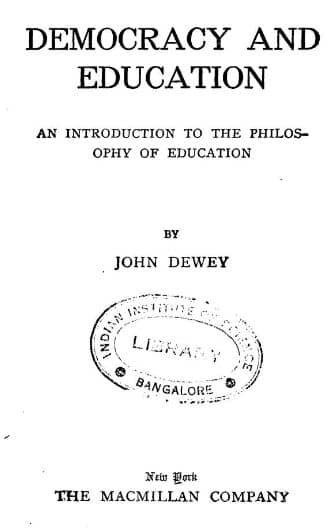‘Democracy And Education’ PDF Quick download link is given at the bottom of this article. You can see the PDF demo, size of the PDF, page numbers, and direct download Free PDF of ‘Democracy And Education’ using the download button.
Democracy And Education PDF Free Download

A BRIEF COURSE IN PHILOSOPHY OF EDUCATION
CHAPTER I
Education As a Necessity Of Life
Renewal of Life by Transmission. The most notable distinction between living and inanimate beings is that the former maintain themselves by renewal.
A stone when struck resists. If its resistance is greater than the force of the blow struck, it remains outwardly unchanged. Otherwise, it is shattered into smaller bits.
Never does the stone attempt to react in such a way that it may maintain itself against the blow, much less so as to render the blow a contributing factor to its own continued action.
While the living thing may easily be crushed by superior force, it nonetheless tries to turn the energies that act upon it into means of its own further existence.
If it cannot do so, it does not just split into smaller pieces (at least in the higher forms of life) but loses its identity as a living thing.
As long as it endures, it struggles to use surrounding energies on its own behalf. It uses light, air, moisture, and the material of soil.
To say that it uses them is to say that it turns them into means of its own conservation.
As long as it is growing, the energy it expends in thus turning the environment to account is more than compensated for by the return it gets: it grows.
Understanding the word ‘control’ in this sense, it may be said that a living being is one that subjugated would otherwise use up.
Life is a self-renewing process through action upon the environment. In all the higher forms this process cannot be kept up indefinitely.
After a while they succumb; they die. The creature is not equal to the task of indefinite self-renewal.
But the continuity of the life process is not dependent upon the prolongation of the existence of any one individual.
Reproduction of other forms of life goes on in continuous sequence. And though, as the geological record shows, not merely individuals but also species die out, the life process continues in increasingly complex forms.
As some species die out, forms better adapted to utilize the obstacles against which they struggled in vain come into being.
Continuity of life means continual readaptation of the environment to the needs of living organisms. We have been speaking of life in its lowest terms—as a physical thing.
But we use the word ‘life’ to denote the whole range of experiences, individual and racial.
When we see a book called the Life of Lincoln we do not expect to find within its covers a treatise on physiology.
We look for an account of social antecedents; a description of early surroundings, of the conditions and occupation of the family; of the chief episodes in the development of character; of signal struggles and achievements; of the individual’s hopes, tastes, joys, and sufferings.
In precisely similar fashion we speak of the life of a savage tribe, of the Athenian people, of the American nation.
“Life” covers customs, institutions, beliefs, victories and defeats, recreations, and occupations.
The School as a Special Environment. — The chief importance of this foregoing statement of the educative process which goes on willynilly is to lead us to note that the only way in which adults consciously control the kind of education which the immature get is by controlling the environment in which they act, and hence think and feel.
We never educate directly, but indirectly by means of the environment. Whether we permit chance environments to do the work, or whether we design environments for the purpose makes a great difference.
And any environment is a chance environment so far as its educative influence is concerned unless it has been deliberately regulated with reference to its educative effect.
An intelligent home differs from an unintelligent one chiefly in that the habits of life and intercourse which prevail are chosen, or at least colored, by the thought of their bearing upon the development of children.
But schools remain, of course, the typical instance of environments framed with express reference to influencing the mental and moral disposition of their members.
The achievements accumulated from generation to generation are deposited in it even though some of them have fallen temporarily out of use.
Consequently as soon as a community depends to any considerable extent upon what lies beyond its own territory and its own immediate generation, it must rely upon the set agency of schools to insure adequate transmission of all its resources.
To take an obvious illustration: The hfe of the ancient Greeks and Romans has profotmdly influenced our own, and yet the ways in which they affect us do not present themselves on the surface of our ordinary experiences.
In similar fashion, peoples still existing, but remote in space, British, Germans, Italians, directly concern our own social affairs, but the nature of the interaction cannot be understood without explicit statement and attention.
In precisely s im ilar fashion, our daily associations cannot be trusted to make clear to the young the part played in our activities by remote physical energies, and by invisible structures.
Hence a special mode of social intercourse is instituted, the school, to care for such matters.
| Author | John Dewey |
| Language | English |
| No. of Pages | 447 |
| PDF Size | 23.1 MB |
| Category | Education |
Related PDFs
Bholi Class 10 Questions And Answers PDF
Class 10 Science Chapter 9 Heredity and Evolution Notes PDF
Weather, Climate, And Adaptations Of Animals To Climate Class 7 Science Notes Chapter 7 PDF
Silk Road Class 11 Questions And Answers PDF
Democracy And Education Book PDF Free Download
